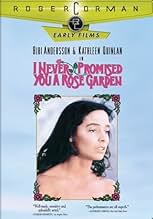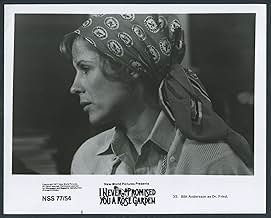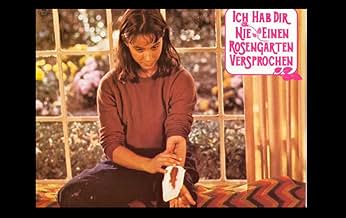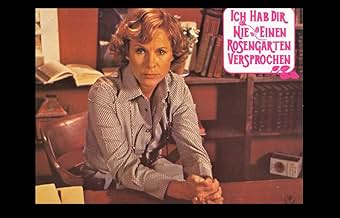Jamais je ne t'ai promis un jardin de roses
Titre original : I Never Promised You a Rose Garden
NOTE IMDb
6,4/10
1,7 k
MA NOTE
Ajouter une intrigue dans votre langueA disturbed, institutionalized 16-year-old girl struggles between fantasy and reality.A disturbed, institutionalized 16-year-old girl struggles between fantasy and reality.A disturbed, institutionalized 16-year-old girl struggles between fantasy and reality.
- Réalisation
- Scénario
- Casting principal
- Nommé pour 1 Oscar
- 4 nominations au total
Karin Collison
- Nurse
- (as Elizabeth Dartmoor)
Barbara Steele
- Idat
- (scènes coupées)
Avis à la une
10Dara-3
Kathleen Quinlan plays Deborah, a very bright girl, who is institutionalized for three years in a psychiatric hospital. Though different from the book in some ways, this keeps the spirit of it quite well and with a much more satisfying ending than the book. Quinlan is a wonderful actress. Deborah, who is diagnosed as a schizophrenic (though she probably wouldn't be today), has a long, torturous journey through her illness. Quinlan makes us believe that she will succeed. In addition, there is a strong cast of mostly women of many ages. I saw this film first when I was a teenager and the problems Deborah faced also resonated with me (despite not being in a hospital). I have never forgotten this film, though it has been out of print on video for many years and can only view it when it occasionally makes it on television. Catch it if you can -- especially if you are a teenage girl or ever were.
Right after "One Flew Over the Cuckoo's Nest" offered a scathing look at mental institutions, "I Never Promised You a Rose Garden" offered a similar sort of look. Portraying young Deborah Blake (Kathleen Quinlan) getting put in one and experiencing the unpleasant things there while Dr. Fried (Bibi Andersson) tries to help her, the movie makes you feel like there's a knife in your stomach. Certainly this institution is not any place where you're likely to become sane. But Deborah has to make her way through no matter what.
There are some pretty disturbing scenes here, and they do a very good job with it. As a director, Roger Corman may be known for camp, but as executive producer here, he cooperated on a well done flick. Also starring Lorraine Gary (Roy Scheider's wife in "Jaws"), Sylvia Sidney (the "Mars Attacks!" grandmother) and a fairly young Dennis Quaid and Clint Howard.
There are some pretty disturbing scenes here, and they do a very good job with it. As a director, Roger Corman may be known for camp, but as executive producer here, he cooperated on a well done flick. Also starring Lorraine Gary (Roy Scheider's wife in "Jaws"), Sylvia Sidney (the "Mars Attacks!" grandmother) and a fairly young Dennis Quaid and Clint Howard.
This is a film which came too late.Anybody who sees it is going to compare it to Anatole Litvak's "the snake pit" (1948).But that was then and this is now and the evolution is barely discernible.If "snake pit" was (unfairly) dismissed as obsolete,what can we say of a movie which was produced thirty years later and (roughly) depicts the same milieu? The most interesting thing in that average-to-good foray into psychiatry is its cast.Bergmanian Bibi Anderson is ideally cast as the shrink who tells the disappointed heroine "I've never promised you a rose garden".But there are also former glories such as Signe Hasso and Sylvia Sydney and future stars (Dennis Quaid).
But there is still a very interesting movie in here with a number of memorable sequences.
The movie is about our protagonist, who to our understanding, is a teenaged girl, who apparently either hallucinates about some bizarre fantasy world (and not in a fun Terry Gilliam way but a seriously bizarre "why would she even consider this superior way?") or merely is in fantasy about it in escaping from reality, it's not explained. It begins as she goes to a mental hospital in the countryside it looks and almost immediately our main character inexplicably stabs herself and gets thrown in a disturbed section as opposed to the initial summer camp section. It is here, where our story follows the rest of the film, a series of up and down spirals and looks at her interactions with the other patients.
The thing about all of this is we never actually get to understand the characters at all. We are never told what they're about, why they feel this way, what their backgrounds are, and why they do what they what they do. They just are, and throughout the whole piece the audience feels like with any of the characters, it never surpasses the point of acquaintment because even, if the characters be developed, they were never characterized in the first place, so it's irrelevant. At the same time, though the movie certainly to its benefit explores the setting and situation in a very visceral way, by the movie's end, everything feels oversaturated, because it feels as though we have spent such time in this setting watching similar things with people that don't really mean much for so long that it just starts to wear thin. When the film end, we aren't really sure why the events have turned out as they did, because we aren't really sure why they were the other way in the first place. It just feels like a breath of fresh air to get a new sense of scenery.
The thing is, though, despite that, the movie is still successful probably because the happenings themselves are rather interesting, the unflinching portrayal has the power to captivate, and there is claustrophobic intensity to the asylum as well as a general heterosexual male (being the viewer) to recessive female women appeal, which really adds a type of close-knit feel with the characters.
So, it's not the most satisfying nor the most well-devised film of its genre out there, but if you be a fan of asylum films, this is definitely worth checking out. I also must note that out of all the mental hospital films out there, this is probably the most intense. This movie is 100% serious and very frightening and unsettling. There's no comedy nor light-heart in this movie. The tone is closer to a horror film (despite that it is a pure dramatic realism) than it is to One Flew Over the Cuckoo's Nest. From that perspective this film is actually very unique.
The movie is about our protagonist, who to our understanding, is a teenaged girl, who apparently either hallucinates about some bizarre fantasy world (and not in a fun Terry Gilliam way but a seriously bizarre "why would she even consider this superior way?") or merely is in fantasy about it in escaping from reality, it's not explained. It begins as she goes to a mental hospital in the countryside it looks and almost immediately our main character inexplicably stabs herself and gets thrown in a disturbed section as opposed to the initial summer camp section. It is here, where our story follows the rest of the film, a series of up and down spirals and looks at her interactions with the other patients.
The thing about all of this is we never actually get to understand the characters at all. We are never told what they're about, why they feel this way, what their backgrounds are, and why they do what they what they do. They just are, and throughout the whole piece the audience feels like with any of the characters, it never surpasses the point of acquaintment because even, if the characters be developed, they were never characterized in the first place, so it's irrelevant. At the same time, though the movie certainly to its benefit explores the setting and situation in a very visceral way, by the movie's end, everything feels oversaturated, because it feels as though we have spent such time in this setting watching similar things with people that don't really mean much for so long that it just starts to wear thin. When the film end, we aren't really sure why the events have turned out as they did, because we aren't really sure why they were the other way in the first place. It just feels like a breath of fresh air to get a new sense of scenery.
The thing is, though, despite that, the movie is still successful probably because the happenings themselves are rather interesting, the unflinching portrayal has the power to captivate, and there is claustrophobic intensity to the asylum as well as a general heterosexual male (being the viewer) to recessive female women appeal, which really adds a type of close-knit feel with the characters.
So, it's not the most satisfying nor the most well-devised film of its genre out there, but if you be a fan of asylum films, this is definitely worth checking out. I also must note that out of all the mental hospital films out there, this is probably the most intense. This movie is 100% serious and very frightening and unsettling. There's no comedy nor light-heart in this movie. The tone is closer to a horror film (despite that it is a pure dramatic realism) than it is to One Flew Over the Cuckoo's Nest. From that perspective this film is actually very unique.
This isn't a film that always works, but when it does, it finds its way so deep under your skin that the pain is surprising. The acting is what stands above everything else here. I suppose I'd seen Kathleen Quinlan before, but I can't say I've ever really noticed her. Maybe it's because she's so young, so human here that it stands out amongst everything else she did before and after this. Her performance is wild, heartbreaking, intensely realized. Other performances, like Bibi Andersson, are great, but not as essential as Quinlan.
This is ground that has been covered with perhaps more consistency (in a cinematic sense) with films like "Girl, Interrupted" but never with the same emotional depth as here. Anthony Page makes a lot of strange, even bad directorial decisions perhaps, but he captures a crazed, uneasy tone in the cinematography and performances that brings it all together. The only odd points are the off-center dreams/hallucination sequences and out-of-place soundtrack. If you can overlook these, this is a truly great film. It really tore my heart out.
This is ground that has been covered with perhaps more consistency (in a cinematic sense) with films like "Girl, Interrupted" but never with the same emotional depth as here. Anthony Page makes a lot of strange, even bad directorial decisions perhaps, but he captures a crazed, uneasy tone in the cinematography and performances that brings it all together. The only odd points are the off-center dreams/hallucination sequences and out-of-place soundtrack. If you can overlook these, this is a truly great film. It really tore my heart out.
Le saviez-vous
- AnecdotesThe lead female role of of Deborah Blake in this picture was previously intended for Natalie Wood who had unrealized plans to both produce and star in the movie. Wood once had planned to produce the picture as well as star in it in the role of Deborah Blake but those plans never materialized. The part in the end was played in the film by Kathleen Quinlan.
- GaffesIn the New Year's Eve party scene, Deborah is seen with loose hair talking to Dr. Fried and then there is a close-up of Deborah with her hair pulled back from her forehead.
- Citations
Deborah Blake: You can turn me off, you know. You can go off with your friends and write another paper on schizophrenia and get an award for it. But I can't turn me off. So I'm calling off the fight.
Dr. Fried: So you quit. Stay in the nuthouse for the rest of your life.
Meilleurs choix
Connectez-vous pour évaluer et suivre la liste de favoris afin de recevoir des recommandations personnalisées
- How long is I Never Promised You a Rose Garden?Alimenté par Alexa
Détails
- Date de sortie
- Pays d’origine
- Site officiel
- Langue
- Aussi connu sous le nom de
- I Never Promised You a Rose Garden
- Sociétés de production
- Voir plus de crédits d'entreprise sur IMDbPro
Contribuer à cette page
Suggérer une modification ou ajouter du contenu manquant






















